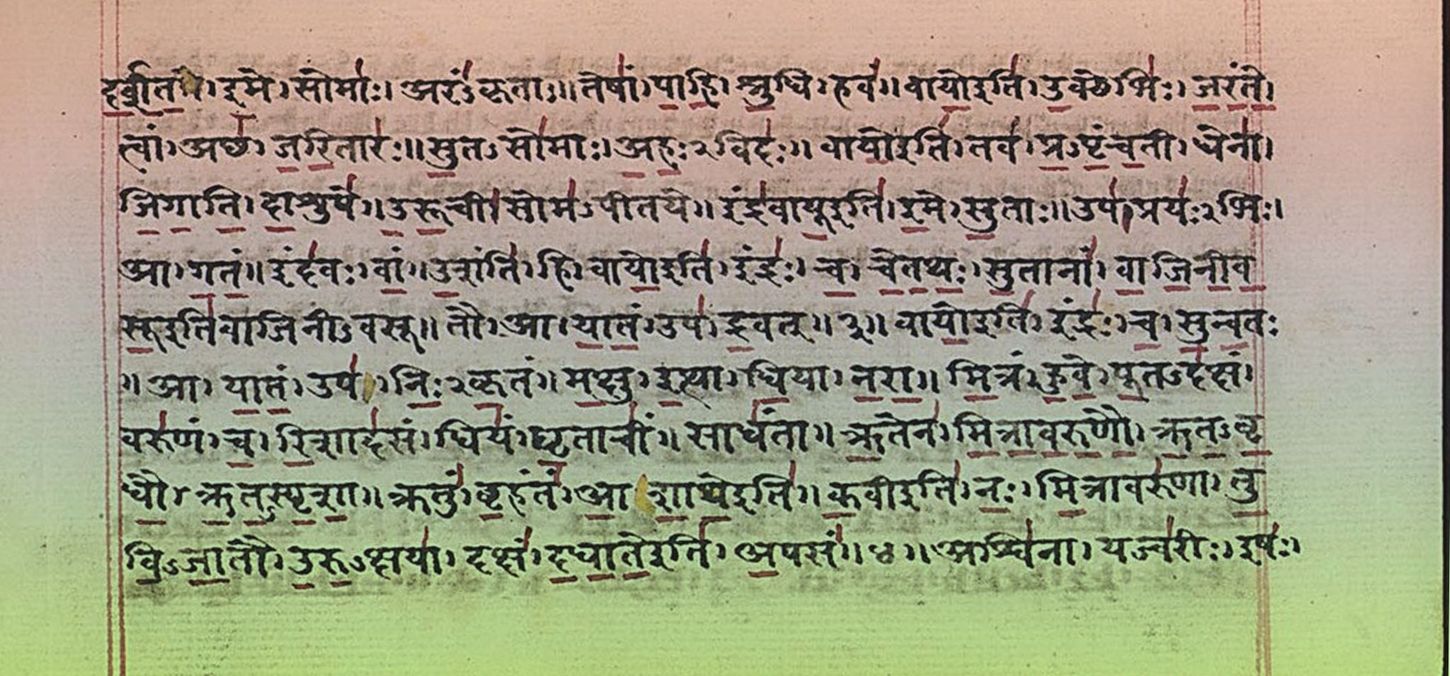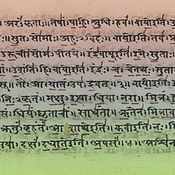
Lerne mit Dr. Ronald Steiner diesen Abschnitt genauer kennen.
Er erläutert den Sinn sowie den Text und Du kannst ihn mit ihm im Triṣṭubh / Jagatī Metrum und dann im Anuṣṭubh Metrum rezitieren. Abschließend hast Du die Gelegenheit, den Sinnabschnitt in einer kleinen Meditation auf Dich wirken zu lassen.
Hier geht es zum Video >>
Das alte Brahman (Gebet) bring' ich euch in Ehrfurcht;
Weit dringt der Ruf, wie Sonnen ihre Bahn ziehn;
Des Ew'gen Kinder alle ihn vernehmen,
Und die in Wohnungen des Himmels schalten.
Paul Deussen - 1897
1 Your old prayer has to be joined 2 with praises. Let my song go forth like the path of the sun! May all the sons of the Immortal listen, they who have reached their heavenly homes.
Max Müller - 1879
| 1: | For this verse, see Taitt. Samh. IV, 1, 1, 2, 1; Vâg. Samh. XI, 5; Atharva-veda XVIII, 3, 39; Rig-veda X, 13, 1. The Vâgasaneyins read vi sloka etu for vi slokâ yanti; sûreh for sûrâh; srinvantu for srinvanti; and the Rig-veda agrees with them. The dual vâm is accounted for by the verse belonging to a hymn celebrating the two sakatas, carts, bearing the offerings (havirdhâne); most likely, however, the dual referred originally to the dual deities of heaven and earth. I prefer the text of the Rig-veda and the Vâgasaneyins to that of the Taittirîyas, and have translated the verse accordingly. In the Atharva-veda XVIII, 39, if we may trust the edition, the verse begins with svâsasthe bhavatam indave nah, which is really the end of the next verse (Rv. X, 13, 2), while the second line is, vi sloka eti pathyeva sûrih srinvantu visve amritâsa etat. I see no sense in pathyeva sûrâh. Saṅkara explains pathyeva by pathi sanmârge, athavâ pathyâ kîrtih, while his later commentary, giving srinvantu and putrâh sûrâtmano hiranyagarbhasya, leads one to suppose that he read sûreh srinvantu. Sâyana (Taitt. Samh. IV, 1, 1, 2) explains pathyâ sûrâ iva by gîrvânamârga antarikshe sûryarasmayo yathâ prasaranti tadvat. The same, when commenting on the Rig-veda (X, 13, 1), Says: pathyâ-iva sûreh, yathâ stotuh svabhûtâ pathyâ parinâmasukhâvahâhutir visvân devân prati vividham gakkhati tadvat. Mahîdhara (Vâg. Samh. XI, 5) refers sûreh (panditasya) to slokah, and explains pathyeva by patho 'napetâ pathyâ yagñamârgapravrittâhutih. |
| 2: | Yugé cannot stand for yuñge, as all commentators and translators suppose, but is a datival infinitive. Neither can yuñgate in the following verse stand for yuṅkte (see Boehtlingk, s. v.), or be explained as a subjunctive form. A. reads adhirudhyate, B. abhirudhyate, with a marginal note abhinudyate. It is difficult to say whether in lighting the fire the wind should be directed towards it, or kept from it. |
Wo Agni aus dem Reibholze
Entspringt, wo Vâyu tritt hinzu,
Und wo auch Soma quillt reichlich,
Da entwickelt das Manas sich.
Paul Deussen - 1897
Where the fire is rubbed 3,
where the wind is checked,
where the Soma flows over,
there the mind is born.
Max Müller - 1879
| 3: | That is, at the Soma sacrifice, after the fire has been kindled and stirred by the wind, the poets, on partaking of the juice, are p. 241 inspirited for new songs. Saṅkara, however, suggests another explanation as more appropriate for the Upanishad, namely, 'Where the fire, i.e. the Highest Self, which burns all ignorance, has been kindled (in the body, where it has been rubbed with the syllable Om), and where the breath has acted, i.e. has made the sound peculiar to the initial stages of Yoga, there Brahman is produced.' In fact, what was intended to be taught was this, that we must begin with sacrificial acts, then practise yoga, then reach samâdhi, perfect knowledge, and lastly bliss. |
Durch Savitar, durch seinen Trieb
Freut des Gebets, des alten, euch;
Wenn dort ihr euren Stand nehmet,
Befleckt euch früh'res Werk nicht mehr.
Paul Deussen - 1897
Let us love the old Brahman by the grace of Savitri;
if thou make thy dwelling there, the path will not hurt thee 1.
Max Müller - 1879
| 1: | We must read krinavase, in the sense of 'do this and nothing will hurt thee,' or, if thou do this, thy former deeds will no longer hurt thee. |



 Dr. Ronald Steiner
Dr. Ronald Steiner
 Nils Jacob Liersch
Nils Jacob Liersch

Nachrichten und Bewertungen